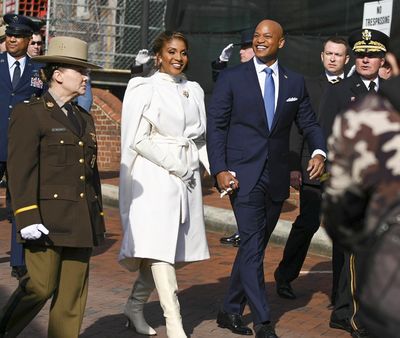Wes Moore takes oath of office as Maryland’s first Black governor

ANNAPOLIS, Md. — Wes Moore, placing his hand on a Bible once owned by abolitionist Frederick Douglass, took his oath of office Wednesday to become Maryland’s 63rd governor, the state’s first and the country’s only current Black chief executive.
Moore was sworn in alongside his family, new Lt. Gov. Aruna Miller and state lawmakers inside the State House’s Senate chamber in Annapolis and was set to address a crowd of well-wishers outside the historic building after being introduced by Oprah Winfrey.
The moment punctuated the swift and historic rise of Moore, a 44-year-old political newcomer living in Baltimore who became a rising star in Democratic politics during a campaign in which he pledged to tackle generational problems such as child poverty and racial wealth gaps.
A former bestselling author, Army veteran and nonprofit leader, Moore had spent his career circling politics before jumping into the race to succeed Republican Larry Hogan, who left office after eight years with high approval ratings among voters of both parties. Maryland governors are limited to two four-year terms.
After defeating a crowded field of experienced Democrats in the primary, Moore’s 32 percentage-point victory over Republican Dan Cox in November marked the largest winning margin for any governor in the state in nearly four decades.
In the months since the election, Moore has kept quiet about his specific and immediate policy plans while saying voters overwhelmingly supported his vision to make the coming years “Maryland’s decade.”
Though he sometimes downplayed during the campaign the fact that he would be Maryland’s first Black governor — saying repeatedly his “assignment was not to make history” — his inauguration day was planned to embrace Maryland’s Black heritage.
That included a visit earlier in the morning to City Dock in Annapolis, where enslaved Africans once arrived on Maryland’s shores. Of the gathering with prominent Black leaders, including former Massachusetts Gov. Deval Patrick, Moore said it was important to acknowledge Maryland’s long road from slavery to his inauguration.
Among those who joined him there were newly sworn-in Attorney General Anthony Brown and former NAACP leader Ben Jealous. They’re the most recent prior Democratic nominees for governor, who many expected would be the ones to break the color barrier in Maryland’s top elected office.
Sherrilyn Ifill, a former University of Maryland School of Law professor and former president of the NAACP Legal Defense Fund, said at City Dock that Moore “has invited us to ask, ‘How should we reconcile this auspicious moment with the history that calls us from this place?’”
She spoke of Douglass sailing past the very spot they were standing 197 years ago as he traveled as an enslaved boy from the Eastern Shore to Baltimore. She also spoke of Kunta Kinte, the ancestor of “Roots” author Alex Haley, and whose name is memorialized at the dock because of his arrival there in 1767.
”This history, the history of chattel slavery in this country and in the state of Maryland, has shaped the political, social, economic and legal infrastructure of our cities, counties and our state. We cannot deny it, much as we may try,” Ifill said. “Our confrontation with this history is the only way we can overcome its lingering effects.”
After the brief event, which was not open to the general public, Moore and the group walked the few blocks back to the State House, where people gathered in the surrounding streets and video screens and chairs for guests filled the area known as Lawyer’s Mall west of the State House.
After the inaugural festivities in Annapolis, a “People’s Ball” was planned at the Baltimore Convention Center in the evening.
Moore’s administration faces a tight turnaround to produce both budget and legislative priorities for the 90-day General Assembly session that began last week.
On Friday, he will announce his first state budget plan, outlining the programs and issues he will turn his attention toward during his first year. His team will also introduce bills that he hopes will pass in the Democratic-controlled General Assembly. Legislative leaders have so far expressed optimism in working with Moore and sharing priorities as they control both branches of government for the first time in eight years.
While specifics remain unclear, Moore has spoken with urgency about several topics that he could focus on in the coming days: hiring more state workers to fill vacant or previously eliminated positions, raising the minimum wage to $15 per hour earlier than planned and quickly releasing $3.5 million in funds the General Assembly approved last year to train additional clinicians to perform abortions. Hogan withheld the money after lawmakers expanded abortion access without his approval last year.